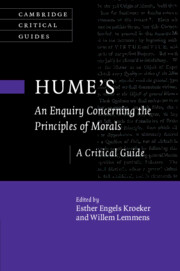Book contents
- Hume’s An Enquiry Concerning the Principles of Morals
- Cambridge Critical Guides
- Hume’s An Enquiry Concerning the Principles of Morals
- Copyright page
- Contents
- Contributors
- Acknowledgments
- Abbreviations
- Introduction
- Chapter 1 The Nature of Morals Founded on the Human Fabric
- Chapter 2 The Pride of Pericles
- Chapter 3 Justice and Politics in the Enquiry Concerning the Principles of Morals
- Chapter 4 History, Context, and the Conventions of Political Society
- Chapter 5 “Why Utility Pleases”
- Chapter 6 Hume on Talents and Moral Virtues
- Chapter 7 Virtues Suspect and Sublime
- Chapter 8 Sympathy and the Sources of Moral Sentiment
- Chapter 9 Virtue and Moral Psychology in the Enquiry Concerning the Principles of Morals
- Chapter 10 Hume, Cicero, and the Ancients
- Chapter 11 Hume on Religion in the Enquiry Concerning the Principles of Morals
- Chapter 12 Moral Disagreement
- Bibliography
- Index
- Cambridge Critical Guides
Chapter 5 - “Why Utility Pleases”
A Surprising Source of Discord
Published online by Cambridge University Press: 08 January 2021
- Hume’s An Enquiry Concerning the Principles of Morals
- Cambridge Critical Guides
- Hume’s An Enquiry Concerning the Principles of Morals
- Copyright page
- Contents
- Contributors
- Acknowledgments
- Abbreviations
- Introduction
- Chapter 1 The Nature of Morals Founded on the Human Fabric
- Chapter 2 The Pride of Pericles
- Chapter 3 Justice and Politics in the Enquiry Concerning the Principles of Morals
- Chapter 4 History, Context, and the Conventions of Political Society
- Chapter 5 “Why Utility Pleases”
- Chapter 6 Hume on Talents and Moral Virtues
- Chapter 7 Virtues Suspect and Sublime
- Chapter 8 Sympathy and the Sources of Moral Sentiment
- Chapter 9 Virtue and Moral Psychology in the Enquiry Concerning the Principles of Morals
- Chapter 10 Hume, Cicero, and the Ancients
- Chapter 11 Hume on Religion in the Enquiry Concerning the Principles of Morals
- Chapter 12 Moral Disagreement
- Bibliography
- Index
- Cambridge Critical Guides
Summary
Section 5 of Hume’s An Enquiry Concerning the Principles of Morals, “Why Utility Pleases,” is a remarkable text for a variety of reasons. First, there is no directly analogous section in the Treatise, so it raises questions about whether Hume engaged in substantial revision of his previous thought. Second, it offers evidence of a normative moral theory. Third, because Hume discusses the role of utility so favorably, it may suggest a nascent form of utilitarianism. Finally, “Why Utility Pleases” advances some of the few positions that draw criticism from Adam Smith. This chapter addresses each of these features. In response to the first, I argue that there are important differences between the Treatise and Section 5, but none that involve a rejection of the claims of the earlier work. In response to the second, I argue that “Why Utility Pleases” is best interpreted as falling squarely within Hume’s descriptive moral psychology. In response to the third, I argue that the notion of Hume as a utilitarian is dubious. Finally, in response to the fourth, I suggest that the disagreement between Smith and Hume, though nuanced and interesting, is not deep.
- Type
- Chapter
- Information
- Hume's An Enquiry Concerning the Principles of MoralsA Critical Guide, pp. 93 - 112Publisher: Cambridge University PressPrint publication year: 2021

